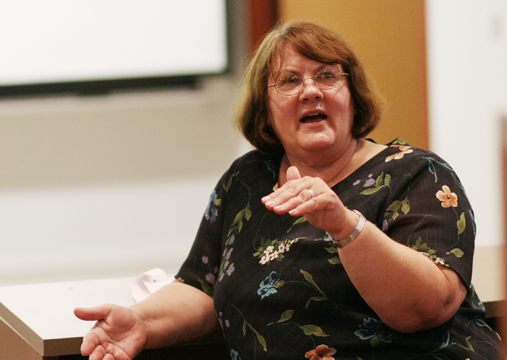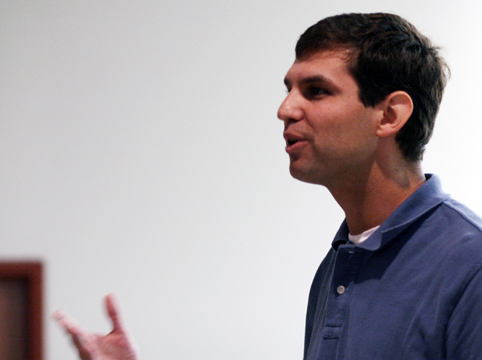 Research conducted by Wabash professors is offering insight into the experiences that most powerfully shape academic and personal development at Wabash and other colleges and universities.
Research conducted by Wabash professors is offering insight into the experiences that most powerfully shape academic and personal development at Wabash and other colleges and universities.
Associate Professor of Rhetoric Todd McDorman and Professor of Psychology Brenda Bankart summed up their findings from separate studies during brief presentations at the College's "Ides of August" conference, which gives Wabash faculty and staff a glimpse of the research and other projects their colleagues worked on over the summer.
Professor Bankart presented results and anecdotes from her study of "First Year Memories of Influential College Experiences." Working from the premise that the stories students tell about themselves reflect their identity and how it changes, Bankart and three student researchers—Matt Boston ’06, Nate Price ’06, and Jake Lundorf ’07—interviewed 58 freshman males from Wabash and a second liberal arts college, asking each "to describe a memory of an influential event that occurred during their first year of college."
The researchers found that "those events that had to do with bonding with other people"—including but not restricted to fraternity pledge activities and other institutional rituals, were most prominent among those first-year memories. They far outscored romantic events, issues of separation from family and loved ones, and athletics and recreational activities.
These events continued in importance when the students were asked the same question as seniors.
"This suggests that a significant understanding of a student’s sense of who he is occurs during these bonding events in freshman year," Bankart said.
She added that the results were surprising in that researchers had assumed this emphasis on "communion" (focus on others) was formative in the development of the identities of college-aged women, but that "agency" (focus on self) was dominant in the development of college-aged men.
"The next question would be, ‘Is communion for male students in the service of agency?" Bankart said. "That fitting in is part of personal competency."
 In "A Comparative Analysis of a Residential Liberal Arts College and a Research University," Professor McDorman presented preliminary findings from his study comparing freshman mentoring programs in Wabash living units to similar programs at one of the state's leading research universities. The study found Wabash fraternities requiring more hours at study tables for freshmen, more careful monitoring of freshman academic progress, and a more multi-layered system for mentoring freshman academically when compared to the research university.
In "A Comparative Analysis of a Residential Liberal Arts College and a Research University," Professor McDorman presented preliminary findings from his study comparing freshman mentoring programs in Wabash living units to similar programs at one of the state's leading research universities. The study found Wabash fraternities requiring more hours at study tables for freshmen, more careful monitoring of freshman academic progress, and a more multi-layered system for mentoring freshman academically when compared to the research university.
"Wabash living units put a greater emphasis on academic mentoring for freshman and seemed to see more of a necessity for academic preparation," McDormand said. He recalled one respondent from the research university saying that freshman mentoring there "leans a little more toward the extracurricular, because the extracurricular activities are so much cooler."
McDormand's latest findings are part of an ongoing study of student life in residential liberal arts colleges and is sponsored in part by the Center of Inquiry in the Liberal Arts at Wabash College.